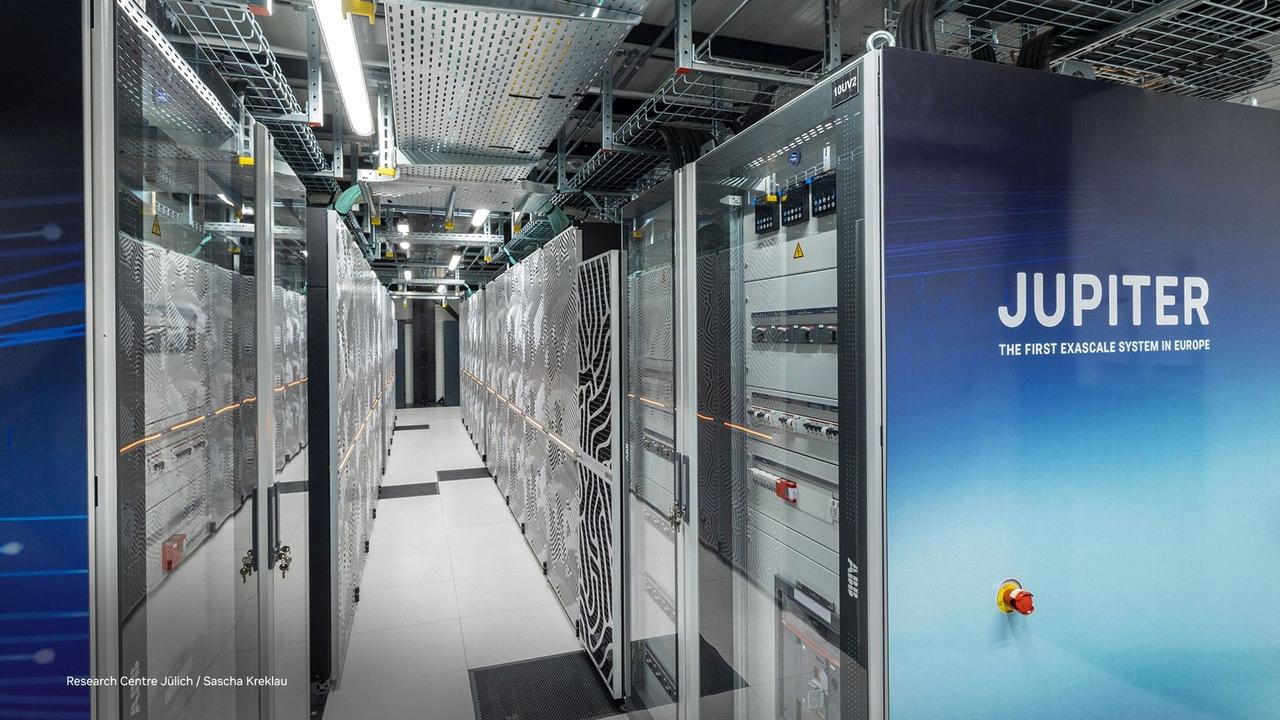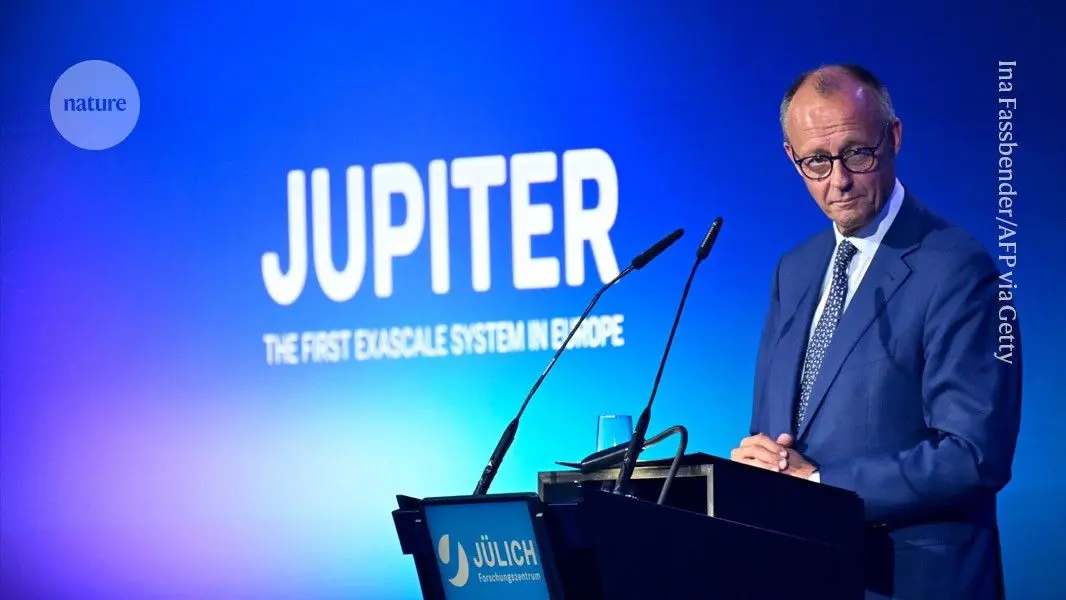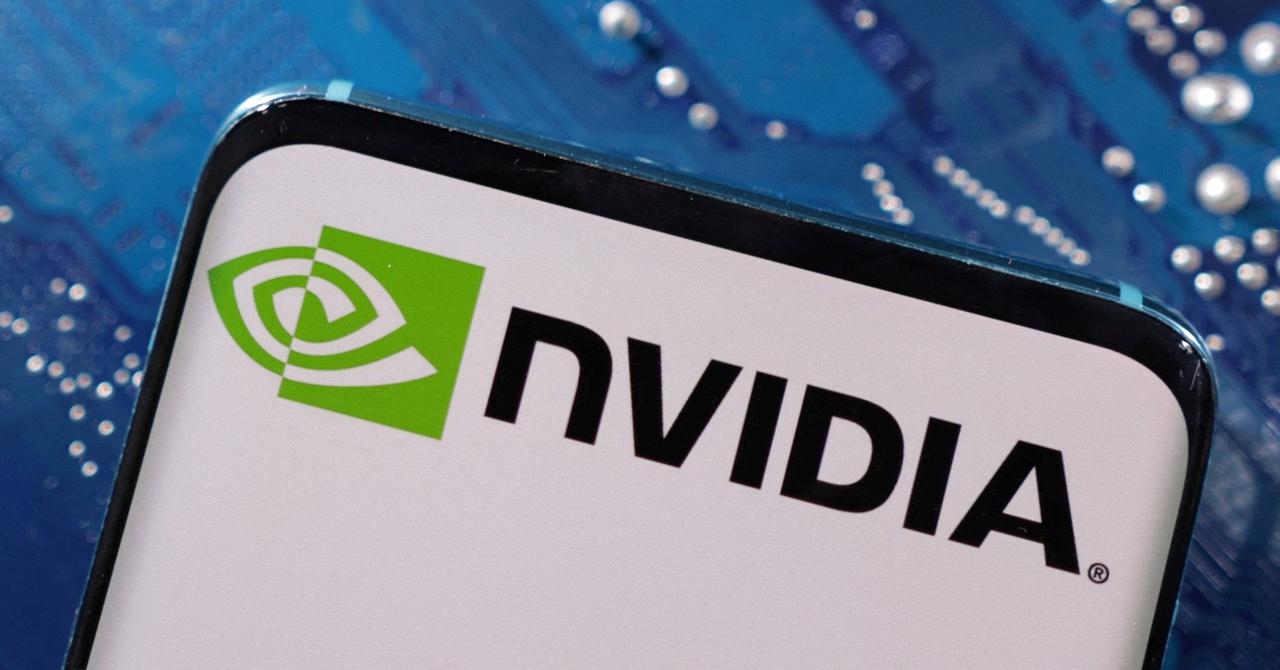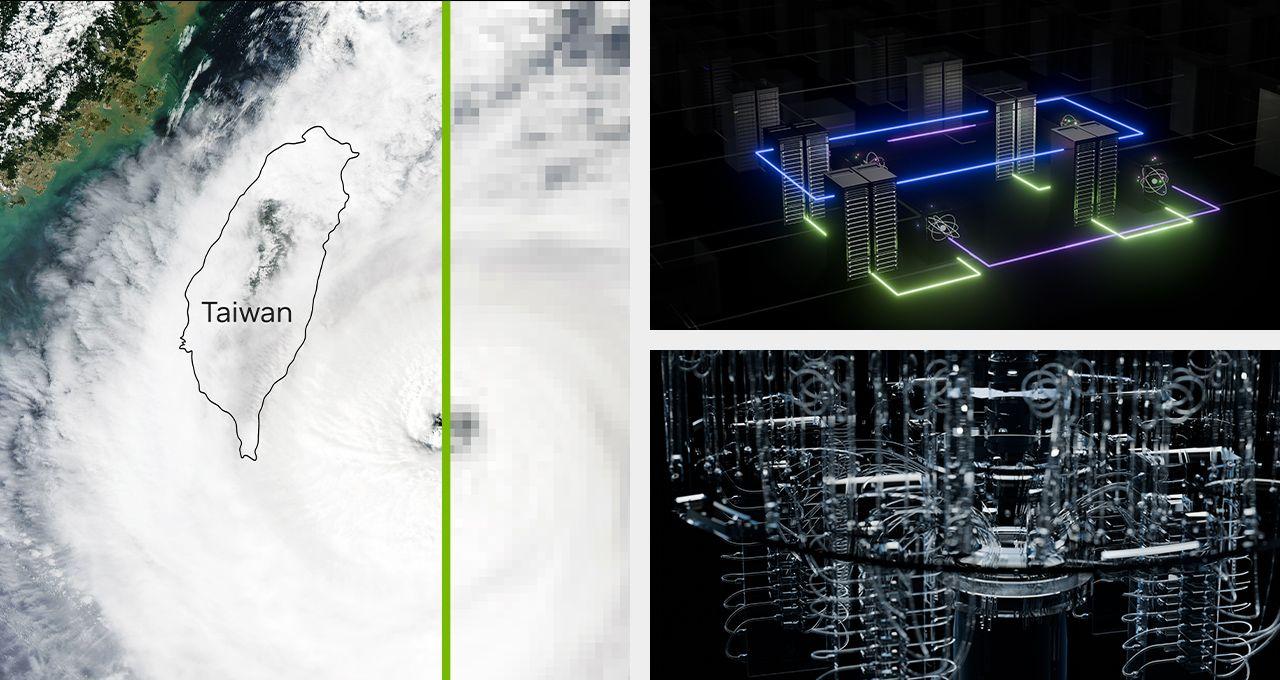Jupiter Supercomputer Takes Europe's HPC Crown, Poised for Exascale Performance
5 Sources
5 Sources
[1]
Jupiter takes Europe's HPC crown in 793PF Top500 run
Full system expected to break the exaFLOP barrier - perhaps in time for SC25 this fall? ISC Germany's long-awaited Jupiter supercomputer launched into the number four spot on the Top500 list of publicly ranked systems, dethroning Italy's HPC6 as Europe's biggest, baddest iron. Developed as part of the EuroHPC Joint Undertaking and built-in collaboration with Nvidia and French supercomputer builder Eviden (formerly Atos), the system is designed to support research across a number of fields, including biophysics, cellular neuroscience, nuclear and elementary particle physics, astrophysics, and climate science. Boffins are also exploring the potential application of machine learning algorithms like those used in diffusion models to generate images to advance areas like medical imaging and autonomous vehicles. In its first appearance on the biannual ranking, the Jülich Supercomputing Center's (JSC) flagship system managed 793 petaFLOPS of double precision (FP64) grunt in the time-honored High-Performance Linpack (HPL) benchmark. However, the run is just a teaser for what's to come. Much like the US Department of Energy's Aurora supercomputer in its first appearance on the Top500 in late 2023, Jupiter's is also a partial run. The system is widely expected to be the European continent's first true exascale supercomputer. While Jupiter ranks as Europe's new supercomputing beast, it still falls far short of its American counterparts. The US DoE's El Capitan, Frontier, and Aurora systems remain uncontested as the only three exascale-capable supercomputers on the Top500 at 1.74, 1.35, and 1.01 exaFLOPS, respectively. That's likely to change in the not-so-distant future once Jülich can bring the full force of the Jupiter system to bear on the semiannual benchmark. The machine will only need to pack on another 207 petaFLOPS to its next HPL run to herald Europe's entrance into the exascale era, and just 220 more petaFLOPS to fly above Aurora. That's assuming, of course, the boffins at Argonne don't find a way to eke out a bit more compute from the Intel-based monster. Nvidia insists that when the Jupiter system is complete, it will join its American counterparts in exascale orbit. From our calculations, that should be well within its capabilities. Based on Eviden's BullSequana XH3000 platform, the Jupiter Boost section will feature roughly 6,000 compute nodes, each packed with four Nvidia Grace Hopper Superchips (GH200) and InfiniBand NDR200 networking. Launched in 2023, the GH200 features a Grace CPU with 72 Arm Neoverse V2 cores and 480GB of high-speed LPDDR5x memory meshed to a Hopper GPU with up to 144GB of HBM3e memory via Nvidia's 900GB/s (450GB/s in each direction) NVLink Chip-to-Chip (C2C) interconnect. Each of these superchips boasts double precision performance (FP64) of 34 teraFLOPS vector or 67 teraFLOPS matrix for high-performance computing. With about 24,000 superchips, Jupiter's Booster section promises somewhere between 872 petaFLOPS (vector) and 1.6 exaFLOPS (matrix) performance. However, Jupiter won't be limited to traditional HPC applications. Each superchip is capable of churning out roughly 2 petaFLOPS of dense FP8 compute (double that if you can take advantage of Nvidia's hardware sparsity). On paper, that means Jupiter's Boost should deliver just over half the AI performance of Lawrence Livermore National Laboratory's (LLNL's) El Capitan system at approximately 47 exaFLOPS of dense AI compute versus 87 exaFLOPS on the all AMD system. And that's just for the Booster. Jupiter's Universal Cluster section is slated to use SiPearl's Arm-based Rhea1 CPU, which features 80 Neoverse V1 cores and is equipped with 64GB of HBM. With two Rhea1 processors per node and 1,300 nodes expected to fill the Universal Cluster, the section is expected to contribute another five petaFLOPS of compute to the overall system. Jupiter isn't just Europe's most powerful system -- for its size, it's also among the most efficient of the exascale-class systems, managing 60 gigaFLOPS per watt, putting it just ahead of El Cap at 58 gigaFLOPS per watt. This shouldn't come as too much of a surprise. As we've previously discussed, Nvidia's Grace Hopper Superchips have proven to be remarkably efficient compute units with Jupiter's test-bed system JEDI once again topping the Green500 ranking of the most efficient supercomputers. Jupiter's launch underscores Europe's growing influence in the HPC arena. As of today, five of the ten most powerful systems in the Top500 are based in Europe, a first in the semiannual ranking's more than 30-year history. Alongside Germany's Jupiter, Italy's HPC6 and Leonardo systems hold the number six and 10 spots with 477 and 241 petaFLOPS, respectively. Meanwhile, Switzerland's Alps and Finland's Lumi machines come in eighth and ninth place with 434 and 379 petaFLOPS. And while it didn't quite make the top 10, we can't ignore the United Kingdom's Isambard-AI phase 2 system, which came in 11th place and 216 petaFLOPS. Aside from the US's three exascale giants, the only other American system to grace the top10 is Microsoft's Eagle cluster at 561 petaFLOPS, while Riken's Fugaku continues to hold strong as Japan's only contender in the Top500's upper echelon at 442 petaFLOPS. China, meanwhile, remains missing in action, having largely withdrawn from the Top500 over the past few years. We know the Middle Kingdom already has several home-grown exascale supercomputers deployed, but it simply hasn't released Linpack results. This continues to leave something of a blind spot on the time-honored ranking. ®
[2]
NVIDIA Powers Europe's Fastest Supercomputer
ISC -- NVIDIA today announced that the JUPITER supercomputer, powered by the NVIDIA Grace Hopper™ platform, is the fastest in Europe -- delivering a more than 2x speedup for high-performance computing and AI workloads compared with the next-fastest system. Soon capable of running 1 quintillion FP64 operations per second, JUPITER is on track to be Europe's first exascale supercomputer. The system enables faster simulation, training and inference of the largest AI models -- including for climate modeling, quantum research, structural biology, computational engineering and astrophysics -- empowering European enterprises and nations to drive scientific discovery and innovation. Among the top five systems on the TOP500 list of the world's fastest supercomputers, JUPITER is the most energy efficient, at 60 gigaflops per watt. Comprising nearly 24,000 NVIDIA GH200 Grace Hopper Superchips and interconnected with the NVIDIA Quantum-2 InfiniBand networking platform, JUPITER is expected to reach over 90 exaflops of AI performance and is based on Eviden's BullSequana XH3000 liquid-cooled architecture. JUPITER also incorporates NVIDIA's full stack of software for optimized performance. "AI will supercharge scientific discovery and industrial innovation," said Jensen Huang, founder and CEO of NVIDIA. "In partnership with Jülich and Eviden, we're building Europe's most advanced AI supercomputer to enable the leading researchers, industries and institutions to expand human knowledge, accelerate breakthroughs and drive national advancement." Built for Scientific Breakthroughs Hosted by the Jülich Supercomputing Centre at the Forschungszentrum Jülich facility in Germany, JUPITER is owned by the EuroHPC Joint Undertaking. "With JUPITER's extreme performance, Europe has taken a giant leap into the future of science, technology and sovereignty," said Anders Jensen, executive director of the EuroHPC Joint Undertaking. "JUPITER's computing power will serve as a catalyst for scientific discovery, propelling foundational research across the continent in fields as diverse as climate modeling, energy systems and biomedical innovation." "JUPITER is a landmark achievement for European science and technology," said Thomas Lippert, codirector of the Jülich Supercomputing Centre. "Powered by NVIDIA's accelerated computing and AI platforms, JUPITER is advancing the frontier of foundation model training and high-performance simulation, enabling researchers across Europe to tackle challenges of unprecedented complexity." "JUPITER will substantially advance quantum algorithm and hardware development," added Kristel Michielsen, codirector of the Jülich Supercomputing Centre. "Hybrid quantum HPC-computation will profit from powerful tools such as the NVIDIA CUDA-Q platform and the NVIDIA cuQuantum software development kit." "JUPITER's launch is not just an extraordinary technical success -- delivering an exascale machine and Julich's modular data center in less than nine months -- it marks a pivotal moment for European high-performance computing," said Emmanuel Le Roux, senior vice president and global head of advanced computing at Eviden, Atos Group. "It clearly demonstrated the technological leadership of the European Eviden-led consortium, which designed, built and delivered this world-class system." Early testing of JUPITER was conducted with the Linpack benchmark, which was also used to determine the TOP500 ranking. The JUPITER supercomputer represents a new generation of computing systems, uniting NVIDIA's end-to-end software stack to solve challenges in areas including:
[3]
Nvidia-Powered Jupiter Becomes Europe's Fastest Supercomputer
Jupiter runs on nearly 24,000 Nvidia GH200 chips.Delivers over one quintillion FP64 operations per second.Enables cutting-edge AI, climate, and quantum simulations. Nvidia and the Julich Supercomputing Centre have unveiled Jupiter, Europe's fastest and most energy-efficient supercomputer, marking a significant milestone in high-performance computing (HPC) and artificial intelligence (AI) capabilities across the continent. Built on nearly 24,000 Nvidia GH200 Grace Hopper Superchips and interconnected with the Nvidia Quantum-2 InfiniBand networking platform, Jupiter is the first European supercomputer set to achieve exascale performance, capable of executing over one quintillion FP64 operations per second. It delivers more than twice the performance of the next-fastest system in Europe and ranks among the top five supercomputers globally according to the latest TOP500 list. Also Read: Nvidia and Foxconn Deepen Partnership to Build AI Factory Supercomputer in Taiwan "Soon capable of running 1 quintillion FP64 operations per second, Jupiter is on track to be Europe's first exascale supercomputer. The system enables faster simulation, training and inference of the largest AI models -- including for climate modeling, quantum research, structural biology, computational engineering and astrophysics -- empowering European enterprises and nations to drive scientific discovery and innovation," Nvidia said on Tuesday, June 10, 2025. Nvidia says Jupiter is the most energy-efficient, at 60 gigaflops per watt, and is expected to exceed 90 exaflops in AI performance, thanks to its architecture and the integration of Nvidia's full software stack. Hosted at the Forschungszentrum Julich in Germany and owned by the EuroHPC Joint Undertaking, Jupiter is built on Eviden's BullSequana XH3000 liquid-cooled infrastructure. "AI will supercharge scientific discovery and industrial innovation," said Jensen Huang, founder and CEO of Nvidia. "In partnership with Julich and Eviden, we're building Europe's most advanced AI supercomputer to enable the leading researchers, industries and institutions to expand human knowledge, accelerate breakthroughs and drive national advancement." Jupiter supports several software platforms, including Nvidia Earth-2 for real-time climate and weather simulations, CUDA-Q and cuQuantum for quantum computing research, and BioNeMo for drug discovery. The system also leverages Nvidia Omniverse and PhysicsNeMo frameworks for engineering and digital twin applications. "With Jupiter's extreme performance, Europe has taken a giant leap into the future of science, technology and sovereignty," said Anders Jensen, executive director of the EuroHPC Joint Undertaking. "Jupiter's computing power will serve as a catalyst for scientific discovery, propelling foundational research across the continent in fields as diverse as climate modeling, energy systems and biomedical innovation." "Jupiter is a landmark achievement for European science and technology," said Thomas Lippert, codirector of the Julich Supercomputing Centre. "Powered by Nvidia's accelerated computing and AI platforms, Jupiter is advancing the frontier of foundation model training and high-performance simulation, enabling researchers across Europe to tackle challenges of unprecedented complexity." Also Read: OpenAI and IndiaAI Mission Partner to Launch OpenAI Academy in India "Jupiter will substantially advance quantum algorithm and hardware development," added Kristel Michielsen, codirector of the Julich Supercomputing Centre. "Hybrid quantum HPC-computation will profit from powerful tools such as the Nvidia CUDA-Q platform and the Nvidia cuQuantum software development kit." "Jupiter's launch is not just an extraordinary technical success -- delivering an exascale machine and Julich's modular data center in less than nine months -- it marks a pivotal moment for European high-performance computing," said Emmanuel Le Roux, senior vice president and global head of advanced computing at Eviden, Atos Group. "It clearly demonstrated the technological leadership of the European Eviden-led consortium, which designed, built and delivered this world-class system." According to Nvidia, early benchmarks using the Linpack test confirmed Jupiter's high placement on the TOP500 list.
[4]
Nvidia's Grace Hopper Platform Powers Europe's Fastest AI Supercomputer - NVIDIA (NASDAQ:NVDA)
Nvidia Corp NVDA on Tuesday announced that the JUPITER supercomputer, powered by the Nvidia Grace Hopper platform, is the fastest in Europe. It delivers more than twice the speedup for high-performance computing and AI workloads compared with the next-fastest system. Soon capable of running 1 quintillion FP64 operations per second, JUPITER is on track to be Europe's first exascale supercomputer. Also Read: Amazon Takes On Nvidia With Cheaper AI Supercomputers, Servers The system enables faster simulation, training, and inference of the largest AI models, including climate modeling, quantum research, structural biology, computational engineering, and astrophysics. Comprising nearly 24,000 Nvidia GH200 Grace Hopper Superchips and interconnected with the Nvidia Quantum-2 InfiniBand networking platform, JUPITER will likely reach over 90 exaflops of AI performance and is based on Eviden's BullSequana XH3000 liquid-cooled architecture. JUPITER also incorporates Nvidia's full stack of software for optimized performance. Jensen Huang, founder and CEO of Nvidia, said, "In partnership with Jülich and Eviden, we're building Europe's most advanced AI supercomputer to enable the leading researchers, industries and institutions to expand human knowledge, accelerate breakthroughs and drive national advancement." JUPITER is owned by the EuroHPC Joint Undertaking and hosted by the Jülich Supercomputing Centre at the Forschungszentrum Jülich facility in Germany. Supercomputers gained traction for their ability to tackle complex, computationally intensive tasks beyond conventional computers. They hold huge potential as tools for scientific research, artificial intelligence, and various industries. In January 2025, President Donald Trump announced the $500 billion OpenAI, SoftBank SFTBF SFTBY, and Oracle Corp ORCL initiative when OpenAI said Stargate will expand to up to ten sites. Oracle controls the supercomputer being built in the Abilene data center. Amongst recent significant supercomputer initiatives, Dell Technologies DELL and Nvidia to power DOE's next-gen Doudna supercomputer for AI, physics, and molecular research at Berkeley Lab by 2026. In January, Nvidia launched Digits, a desktop-sized personal AI supercomputer likely to be available in May 2025. In May, Nvidia showcased Isaac GR00T N1.5 and Blackwell systems to power next-gen humanoid robots and physical AI. Price Action: Nvidia stock is trading higher by 0.35% to $143.14 premarket at last check Tuesday. Read Next: Google Quantum AI's New Willow Chip Can Do in Minutes That Supercomputers Would Take 10 Septillion Years Photo by Jack Hong via Shutterstock NVDANVIDIA Corp$143.090.32%Stock Score Locked: Want to See it? Benzinga Rankings give you vital metrics on any stock - anytime. Reveal Full ScoreEdge RankingsMomentum70.43Growth98.63QualityNot AvailableValue7.19Price TrendShortMediumLongOverviewDELLDell Technologies Inc$114.14-0.07%ORCLOracle Corp$177.750.34%SFTBFSoftBank Group Corp$62.2721.4%SFTBYSoftBank Group Corp$27.06-%Market News and Data brought to you by Benzinga APIs
[5]
NVIDIA Powers Europe's Fastest Supercomputer
HAMBURG, Germany, June 10, 2025 (GLOBE NEWSWIRE) -- ISC -- NVIDIA today announced that the JUPITER supercomputer, powered by the NVIDIA Grace Hopper™ platform, is the fastest in Europe -- delivering a more than 2x speedup for high-performance computing and AI workloads compared with the next-fastest system. Soon capable of running 1 quintillion FP64 operations per second, JUPITER is on track to be Europe's first exascale supercomputer. The system enables faster simulation, training and inference of the largest AI models -- including for climate modeling, quantum research, structural biology, computational engineering and astrophysics -- empowering European enterprises and nations to drive scientific discovery and innovation. Among the top five systems on the TOP500 list of the world's fastest supercomputers, JUPITER is the most energy efficient, at 60 gigaflops per watt. Comprising nearly 24,000 GH200 Grace Hopper Superchips and interconnected with the Quantum-2 InfiniBand networking platform, JUPITER is expected to reach over 90 exaflops of AI performance and is based on Eviden's BullSequana XH3000 liquid-cooled architecture. JUPITER also incorporates NVIDIA's full stack of software for optimized performance. "AI will supercharge scientific discovery and industrial innovation," said , founder and CEO of . "In partnership with Jülich and Eviden, we're building Europe's most advanced AI supercomputer to enable the leading researchers, industries and institutions to expand human knowledge, accelerate breakthroughs and drive national advancement." Built for Scientific Breakthroughs Hosted by the Jülich Supercomputing Centre at the Forschungszentrum Jülich facility in , JUPITER is owned by the EuroHPC Joint Undertaking. "With JUPITER's extreme performance, has taken a giant leap into the future of science, technology and sovereignty," said , executive director of the EuroHPC Joint Undertaking. "JUPITER's computing power will serve as a catalyst for scientific discovery, propelling foundational research across the continent in fields as diverse as climate modeling, energy systems and biomedical innovation." "JUPITER is a landmark achievement for European science and technology," said , codirector of the Jülich Supercomputing Centre. "Powered by NVIDIA's accelerated computing and AI platforms, JUPITER is advancing the frontier of foundation model training and high-performance simulation, enabling researchers across to tackle challenges of unprecedented complexity." "JUPITER will substantially advance quantum algorithm and hardware development," added , codirector of the Jülich Supercomputing Centre. "Hybrid quantum HPC-computation will profit from powerful tools such as the CUDA-Q platform and the cuQuantum software development kit." "JUPITER's launch is not just an extraordinary technical success -- delivering an exascale machine and Julich's modular data center in less than nine months -- it marks a pivotal moment for European high-performance computing," said , senior vice president and global head of advanced computing at Eviden, . "It clearly demonstrated the technological leadership of the European Eviden-led consortium, which designed, built and delivered this world-class system." Early testing of JUPITER was conducted with the Linpack benchmark, which was also used to determine the TOP500 ranking. The JUPITER supercomputer represents a new generation of computing systems, uniting NVIDIA's end-to-end software stack to solve challenges in areas including: German and other European researchers can apply for access to JUPITER. Certain statements in this press release including, but not limited to, statements as to: AI supercharging scientific discovery and industrial innovation; in partnership with Jülich and Eviden, building Europe's most advanced AI supercomputer to enable the leading researchers, industries and institutions to expand human knowledge, accelerate breakthroughs and drive national advancement; the benefits, impact, performance, and availability of NVIDIA's products, services, and technologies; expectations with respect to NVIDIA's third party arrangements, including with its collaborators and partners; expectations with respect to technology developments; and other statements that are not historical facts are forward-looking statements within the meaning of Section 27A of the Securities Act of 1933, as amended, and Section 21E of the Securities Exchange Act of 1934, as amended, which are subject to the "safe harbor" created by those sections based on management's beliefs and assumptions and on information currently available to management and are subject to risks and uncertainties that could cause results to be materially different than expectations. Important factors that could cause actual results to differ materially include: global economic and political conditions; NVIDIA's reliance on third parties to manufacture, assemble, package and test NVIDIA's products; the impact of technological development and competition; development of new products and technologies or enhancements to NVIDIA's existing product and technologies; market acceptance of NVIDIA's products or NVIDIA's partners' products; design, manufacturing or software defects; changes in consumer preferences or demands; changes in industry standards and interfaces; unexpected loss of performance of NVIDIA's products or technologies when integrated into systems; and changes in applicable laws and regulations, as well as other factors detailed from time to time in the most recent reports files with the , or , including, but not limited to, its annual report on Form 10-K and quarterly reports on Form 10-Q. Copies of reports filed with the are posted on the company's website and are available from without charge. These forward-looking statements are not guarantees of future performance and speak only as of the date hereof, and, except as required by law, disclaims any obligation to update these forward-looking statements to reflect future events or circumstances. © 2025 . All rights reserved. , the logo, CUDA-Q, CUDA-X, BioNeMo, Grace Hopper, Omniverse and PhysicsNeMo are trademarks and/or registered trademarks of in the and other countries. Other company and product names may be trademarks of the respective companies with which they are associated. Features, pricing, availability and specifications are subject to change without notice. A photo accompanying this announcement is available at https://www.globenewswire.com/NewsRoom/AttachmentNg/a9dfeb6b-23a0-4224-a40e-bd0e75b5e6c9
Share
Share
Copy Link
Europe's Jupiter supercomputer, powered by NVIDIA's Grace Hopper platform, becomes the continent's fastest system, delivering 793 petaFLOPS and aiming for exascale performance.
Europe's New Supercomputing Powerhouse
The long-awaited Jupiter supercomputer has made its debut on the Top500 list, securing the fourth position globally and claiming the title of Europe's most powerful system. Developed as part of the EuroHPC Joint Undertaking and built in collaboration with NVIDIA and Eviden (formerly Atos), Jupiter has dethroned Italy's HPC6 as the continent's top performer
1
.
Source: NVIDIA
Impressive Performance and Efficiency
In its initial appearance, Jupiter achieved 793 petaFLOPS of double precision (FP64) performance on the High-Performance Linpack (HPL) benchmark. This partial run is just a glimpse of its full potential, as the system is expected to break the exaFLOP barrier, potentially becoming Europe's first true exascale supercomputer
1
.Notably, Jupiter stands out as the most energy-efficient among the top five systems on the TOP500 list, delivering 60 gigaflops per watt
2
. This efficiency is crucial for sustainable high-performance computing (HPC) operations.Cutting-Edge Architecture
Jupiter's impressive capabilities stem from its advanced architecture:
- Nearly 24,000 NVIDIA GH200 Grace Hopper Superchips
- NVIDIA Quantum-2 InfiniBand networking platform
- Eviden's BullSequana XH3000 liquid-cooled infrastructure
2
The system is expected to reach over 90 exaflops of AI performance, showcasing its versatility in both traditional HPC and AI workloads
3
.Empowering European Research and Innovation
Hosted by the Jülich Supercomputing Centre in Germany, Jupiter is set to accelerate research across various fields:
- Climate modeling
- Quantum research
- Structural biology
- Computational engineering
- Astrophysics
2
The system's capabilities extend to training and inference of large AI models, positioning Europe at the forefront of scientific discovery and technological innovation
4
.Software Ecosystem and Specialized Platforms
Jupiter leverages NVIDIA's comprehensive software stack, including:
- NVIDIA Earth-2 for climate and weather simulations
- CUDA-Q and cuQuantum for quantum computing research
- BioNeMo for drug discovery
- Omniverse and PhysicsNeMo for engineering and digital twin applications
3
This software ecosystem ensures that Jupiter can address a wide range of complex scientific and industrial challenges.
Related Stories
Europe's Growing HPC Influence
Jupiter's launch underscores Europe's increasing prominence in the global HPC landscape. For the first time in the Top500's 30-year history, five of the ten most powerful systems are based in Europe
1
. This shift reflects the continent's commitment to advancing its technological capabilities and maintaining competitiveness in the rapidly evolving field of supercomputing.Future Prospects and Global Competition

Source: The Register
While Jupiter marks a significant milestone for European HPC, it still trails behind the top three U.S. systems: El Capitan, Frontier, and Aurora. However, with its full potential yet to be realized, Jupiter is poised to narrow this gap and potentially join the exclusive club of exascale supercomputers
1
.As Jupiter continues to evolve and demonstrate its full capabilities, it is set to play a crucial role in driving scientific breakthroughs, industrial innovation, and technological sovereignty for Europe in the coming years
5
.References
Summarized by
Navi
[1]
[4]
[5]
Related Stories
JUPITER: Europe's First Exascale Supercomputer Ignites AI and Scientific Research
06 Sept 2025•Technology

Germany Unveils Jupiter: Europe's Fastest AI Supercomputer in Bid to Catch Up with US and China
06 Sept 2025•Technology

Nvidia and HPE to Build Blue Lion Supercomputer in Germany, Powered by Next-Gen Vera Rubin Architecture
10 Jun 2025•Technology

Recent Highlights
1
OpenAI secures $110 billion funding round from Amazon, Nvidia, and SoftBank at $730B valuation
Business and Economy

2
Anthropic stands firm against Pentagon's demand for unrestricted military AI access
Policy and Regulation

3
Pentagon Clashes With AI Firms Over Autonomous Weapons and Mass Surveillance Red Lines
Policy and Regulation





